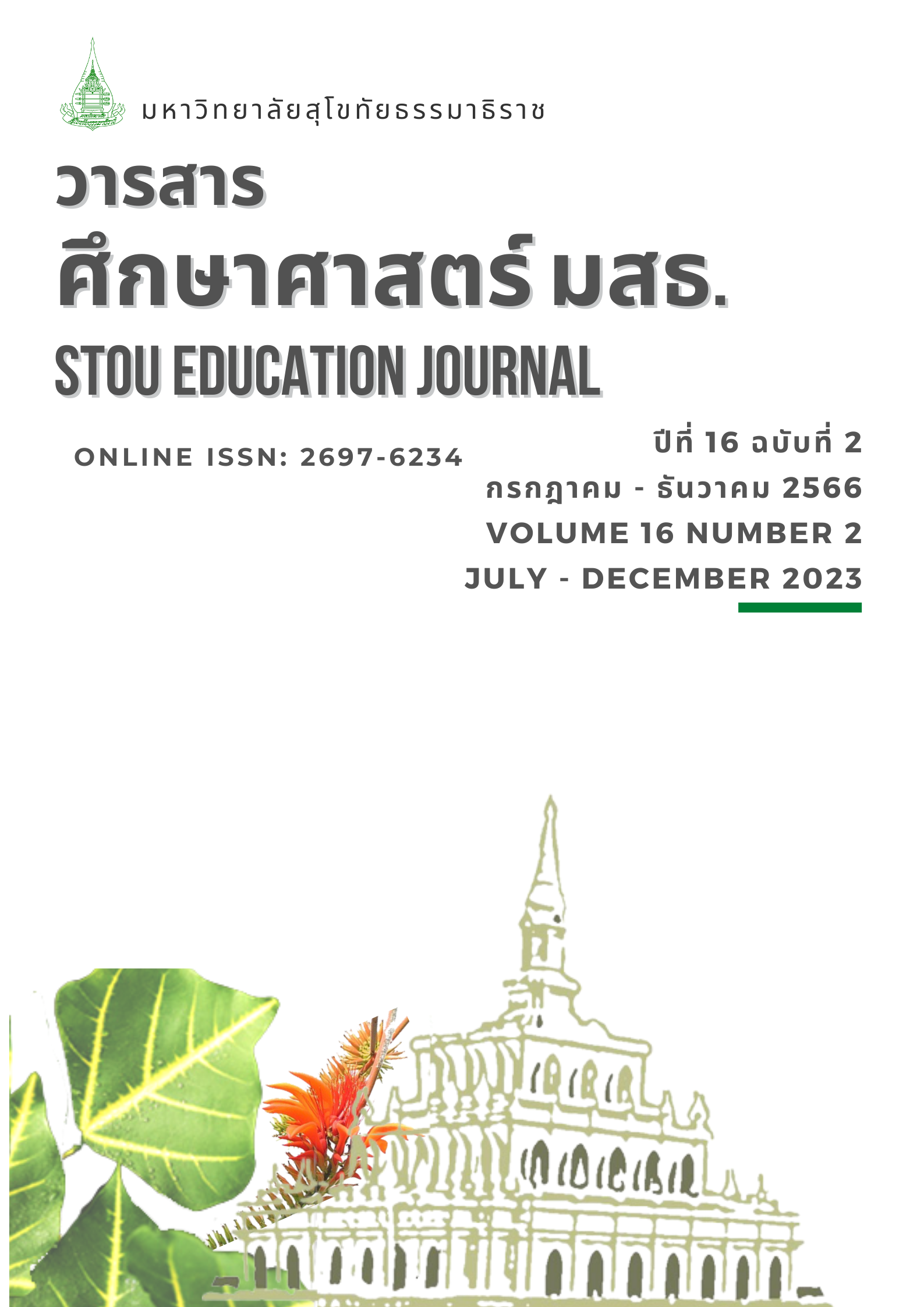Local Wisdom Lesson Distilled in Thonburi Old Town Conservation Area for Tourism Integrated in to Learning Management in School
Main Article Content
Abstract
The objectives of this research were (1) to study the learning resources that are local wisdom in Thon Buri Old Town Conservation Area, and (2) to study lessons distilled for the integration of knowledge about local wisdom in Thon Buri Old Town Conservation Area for Tourism Integrated in to Learning Management in School. This study was a qualitative research. The key research informants were 15 local wisdom persons, and 7 experts classified into supervisors, and teachers. The employed research tool was an interview form. Research data were analyzed with the use of content analysis. The research results showed that (1) the majority of local wisdom persons in Thon Buri Old Town Conservation Area were females, aged over 61 years, with educational qualification of higher than secondary education; most of them lived in Thon Buri area; the majority of their tasks were those that required artisans’ special skills and were anciently inherited from generation to generation; the field of study that had the highest degree of local wisdom was the home economics about food; the learning processes and accumulated experiences had different characteristics, i.e. self-access learning and inheritance from parents, ancestors and kin; in terms of production procedures, they were not complicated with the emphasis on easy production process and the use of materials available in the local community; and (2) the majority of lessons that were taken from local wisdom integrated into learning management in schools in Thonburi Old Town Conservation Area for Tourism included the field of food branch of home economics, the field of invention arts, and the field of fine arts and handicrafts; they could be integrated with the Thai Language Learning Area in both the foundation courses, supplementary courses, and learner development activities, with the integration in the reading, writing, listening, seeing, and speaking substances as well as the the principles of Thai language usage at Grades 7 – 9.
Article Details
References
เรไร ไพรวรรณ์. (2553). คติชนและภูมิปัญญาไทย. มหาวิทยาลัยราชภัฏธนบุรี.
วารี หอมอุดม. (2553). คุณค่าของภูมิปัญญา และวัฒนธรรมไทย และการสืบทอด. http://www.kroobannok.com
วาสนา เพิ่มพูล. (2554). รายงานการวิจัย การถอดบทเรียนภูมิปัญญาท้องถิ่นเพื่อการเรียนรู้ที่ยั่งยืนและนำไปสู่หลักสูตรสถานศึกษา กรณีศึกษา: ชุมชนในเขตธนบุรี กรุงเทพฯ. มหาวิทยาลัยราชภัฏธนบุรี.
สำนักงานคณะกรรมการกำกับหลักทรัพย์และตลาดหลักทรัพย์. (2564). ทรัสต์เพื่อการลงทุนในอสังหาริมทรัพย์ แกรนด์ รอยัล ออคิด โฮสพีทาลิตี้ ที่มีข้อตกลงในการซื้อคืน. https//market.sec.or.th
สำนักงานเลขาธิการสภาการศึกษา. (2562ก). รายงานผลการขับเคลื่อนมาตรฐานการศึกษาของชาติ ประจำปี 2562. 21 เซ็นจูรี่.
สำราญ ผลดี. (2561). ไทยศึกษา. สำนักพิมพ์แห่งจุฬาลงกรณ์มหาวิทยาลัย.
หทัยรัตน์ บุณโยปัษฎัมภ์. (2561). ภูมิปัญญาท้องถิ่นกับการพัฒนา. รุ่งเรือง.
อดิสรณ์ เรืองจุ้ย. (2550). การศึกษาการใช้ภูมิปัญญาท้องถิ่นของครูในการเรียนการสอนกลุ่มสาระการเรียนรู้ภาษาไทยระดับมัธยมศึกษาตอนต้น ในสถานศึกษาสังกัดสำนักงานคณะกรรมการการศึกษาขั้นพื้นฐานในเขตภาคกลาง. [วิทยานิพนธ์ปริญญามหาบัณฑิต ไม่ได้ตีพิมพ์]. จุฬาลงกรณ์มหาวิทยาลัย.


